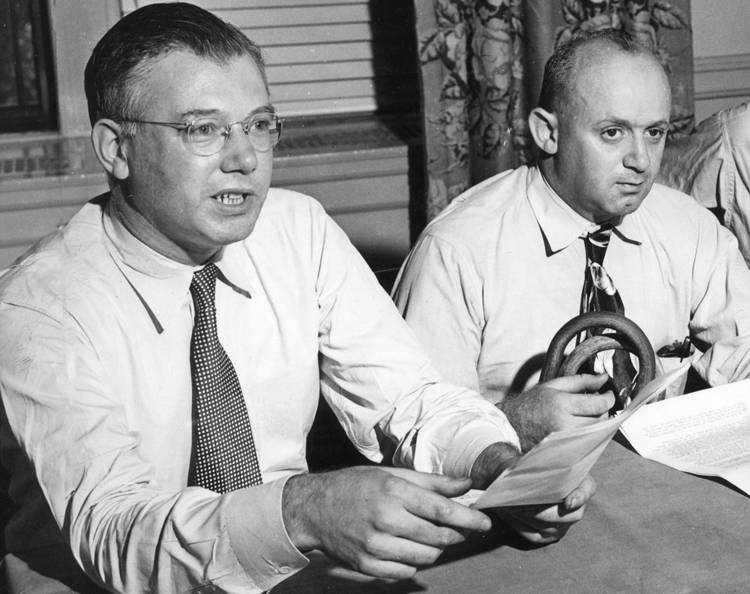The Case of the Legless Veteran by James Kutcher is one of Pathfinder’s Books of the Month for April. In the decade after World War II, the Socialist Workers Party, Communist Party and others were targeted as part of the government’s expanding anti-working-class witch hunt. Kutcher, an SWP member and Veterans Administration worker who lost both legs in World War II, became part of growing resistance to the U.S. rulers’ assault on the unions and constitutional rights. The book records the battle to win back his job and pension, supported by thousands of unionists and other supporters of political liberties. The excerpts below are from the book’s preface and Kutcher’s final chapter, “Summing up.” Copyright © 1973 by Pathfinder Press. Reprinted by permission.
This book tells the story of a battle for workers’ rights and civil liberties during the height of the cold war witch-hunt in the United States.
In 1948 James Kutcher, a worker who had lost both legs in World War II, was fired from his job as a clerk with the Veterans Administration. The stated reason was Kutcher’s membership in the Socialist Workers Party (SWP), which had been included on a list of “subversive” organizations compiled by the U.S. attorney general the year before. Later the government revoked Kutcher’s disability pension and tried to evict him from public housing.
In response to these attacks, defenders of democratic rights launched the Kutcher Civil Rights Defense Committee, winning support from hundreds of organizations and thousands of individuals holding many different political views. After a long and hard-fought battle, the case ended in victory in 1956 when Kutcher was ordered reinstated in his job. He subsequently was awarded back pay.
This eight-year fight was waged from within the labor movement — the central target of the McCarthy-era witch-hunt — reaching out broadly to all supporters of democratic rights. During a period of political victimizations and of relative quiet within the unions, the Kutcher case dealt a blow to the witch-hunters and opened valuable space for working-class fighters to function within the labor movement.
The Case of the Legless Veteran was first published in 1953, as the fight was still going on. In 1973, when the book was republished, two chapters (18 and 19) were added to complete the story. The following year the attorney general’s list of subversive organizations — one of the justifications for the attack on Kutcher — was abolished. In 1986, after a thirteen-year court fight, a federal judge declared in a landmark ruling that the government’s massive, decades-long efforts to spy on and disrupt the SWP were illegal and constituted a violation of the socialists’ constitutionally protected rights. James Kutcher remained a member of the Socialist Workers Party until 1983; he died in 1989.
In today’s world of wars, capitalist depression, and deepening social conflicts, the fight for democratic rights is a vital part of the struggle by working people internationally to defend their interests. The Case of the Legless Veteran offers an invaluable account of one such battle that ended in victory.
* * *
Our victory, partial though it was, also heartened and gave ammunition to those who had not been directly victimized themselves but wanted to stop the repression. It tended to undermine the morale and self-confidence of at least some of the witch-hunters and their followers or dupes. And it had a healthy impact on the great mass of the people who stood in the middle and had not actively committed themselves to either side, whose support both sides were trying to win.
Another factor that must not be overlooked in drawing up any balance sheet relates to the overall aim of the witch-hunt, which was to root out or prevent the development of movements that might oppose Washington’s plans to make the world safe for capitalist investments. A corollary was the complete annihilation, if possible, of parties or groups seeking to pose a socialist or communist alternative in the United States. This last objective came closer to being reached than many young people today realize.
The Socialist Workers Party, the Communist Party and all other radical groups in this country were very badly damaged. Part of their members and supporters were intimidated, and dropped away. Another part became demoralized, and dropped away. Worst of all was the isolation that surrounded them. Inability to get a response to their work strengthened the internal dangers that can destroy any radical movement: opportunist adventures to break out of isolation and sectarian adaptation to isolation.
Although both its ranks and influence were seriously reduced by the witch-hunt, my party managed to survive, with its revolutionary perspectives and integrity intact, until the 1960s when the political climate improved and it began to grow again. … [O]ne of the elements enabling it to survive was the defense campaign waged around my case, which, although it was “only” a civil liberties case, could not be separated from the right of revolutionary socialists to exist and function legally. At the very least it enabled us to break through the shroud of silence and reach millions of people with arguments in favor of that right. If it did nothing else, even if it had not ended with my winning back my job, this alone would have justified our defense work. I know of additional results, because some people have told me that their first interest in socialism was aroused by curiosity about my case and the ideas for which I was being persecuted. …
[O]ur resistance to the witch-hunt undoubtedly had some effect on the calculations of the ruling class. … How much effect our resistance had I cannot say. … [I]t was not the sole cause of the change that was made in the mid-1950s and may not have been the main cause. The ruling class decided on that change, in my opinion, only after a careful consideration of all factors convinced it that a continuation of the witch-hunt along the lines initiated after the war was neither necessary nor in its own best interests.


